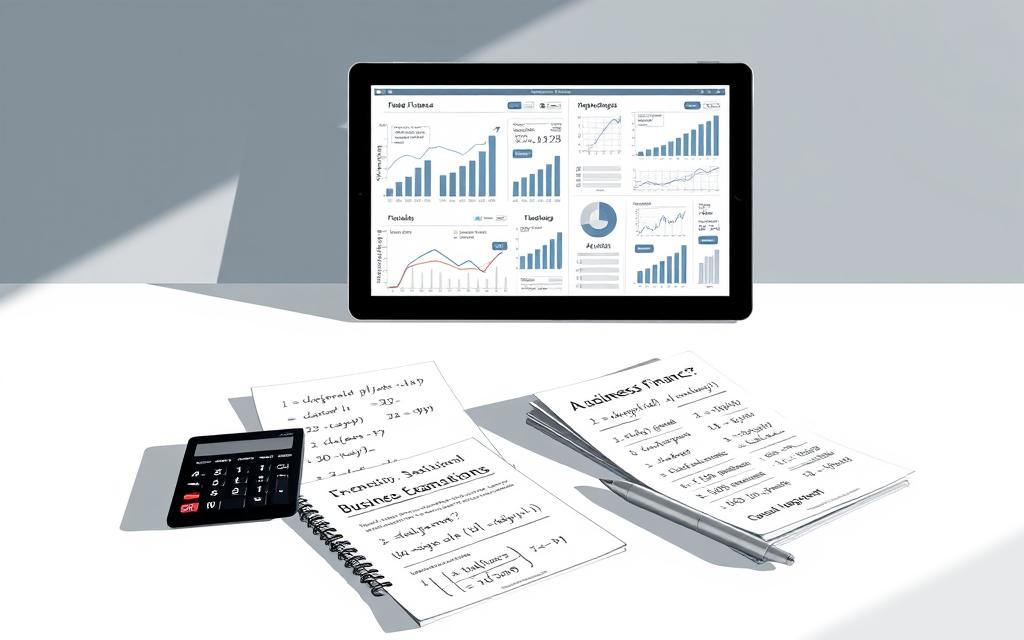Tackling finance questions in A Level Business Studies exams can be daunting for many students. These questions are a crucial part of the assessment across various examination boards, including AQA, Edexcel, OCR, and IB.
Understanding financial concepts and calculations is vital for success in these exams. Our comprehensive guide addresses the challenges students face and provides step-by-step approaches to solving financial problems. By mastering these techniques, students will gain confidence in approaching finance questions and maximise their potential marks. For more practice questions and resources, visit Save My Exams.
Understanding Finance in A Level Business Studies
A Level Business Studies places significant emphasis on finance, requiring students to have a thorough understanding of financial concepts and their applications. Finance is a critical component of business studies, as it underpins many business decisions and strategies.
Key Financial Concepts for A Level Students
Students need to grasp key financial concepts, including working capital management, sources of finance, and cost and profit calculations. These concepts are fundamental to understanding how businesses operate financially and make informed decisions.
Why Finance Questions Matter in Exams
Finance questions are significant in exams because they test both technical accuracy and analytical thinking skills. Strong performance in finance questions can compensate for weaker areas in other sections of the exam paper.
| Financial Concept | Importance in Exams | Skills Tested |
|---|---|---|
| Working Capital Management | High | Calculation, Analysis |
| Sources of Finance | Medium to High | Understanding, Evaluation |
| Cost and Profit Calculations | High | Calculation, Interpretation |
Finance topics appear across different exam papers and require both calculation skills and analytical abilities. Employers particularly value candidates with strong financial literacy, making these skills valuable beyond the exam context.
Common A Level Business Studies Finance Questions
In A Level Business Studies exams, finance questions are designed to evaluate students’ ability to apply financial concepts to real-world scenarios. These questions assess a range of skills, from calculating working capital to analyzing sources of finance.
Working Capital Calculations
Exam papers frequently include questions on working capital calculations, requiring students to demonstrate their understanding of financial management. Effective working capital management is crucial for business success.
Sources of Finance Analysis
Students are expected to analyze various sources of finance, including internal and external options, and understand the factors that influence business finance choices. This requires a deep understanding of financial concepts and their practical applications.
Cost and Profit Calculations
Questions on cost and profit calculations are common in the exam paper, testing students’ ability to identify and categorize costs, calculate profit figures, and interpret financial data. Students must be able to analyze paper-based scenarios to determine revenue, costs, and resulting profit.
To excel in these areas, students should practice a range of question types, including break-even analysis and margin calculations. By mastering these skills, students will be well-prepared for the finance questions in their A Level Business Studies exam.
Effective Strategies for Tackling Finance Questions
To excel in A Level Business Studies finance questions, it’s crucial to adopt effective strategies that enhance your understanding and application of financial concepts. Practice exam questions are essential for mastering finance topics, and revision resources often include video tutorials with built-in pauses to enable active learning during revision sessions.
Understanding the specific requirements of each question is vital. This involves carefully reading the question and identifying the key financial concepts being tested.
Understanding Question Requirements
Begin by analyzing the question to determine what is being asked. Identify the relevant financial formulas and concepts that need to be applied.
Applying Financial Formulas Correctly
Make sure you are familiar with the key financial formulas and can apply them correctly. For more information on revising A Level Business, visit Save My Exams.
Structuring Your Analysis Responses
When structuring your analysis responses, consider the following tips:
- Begin with clear calculations before interpreting the figures.
- Use business terminology accurately and consistently.
- Structure longer responses using paragraphs that focus on different aspects of the financial analysis.
- Include contextual application by referring to the business scenario provided.
- Conclude with clear judgments about the financial implications.
By adopting these strategies, you can improve your performance in the exam paper and achieve success in your A Level Business Studies.
Conclusion
To excel in A Level Business Studies, students must develop a comprehensive understanding of finance. The key points to mastering finance questions include combining technical knowledge with a strategic approach, practising with past papers, and understanding underlying business concepts.
By applying these techniques to various finance questions, students can build confidence. For further support, they can email our team of specialists, providing a comprehensive overview of their specific needs.













